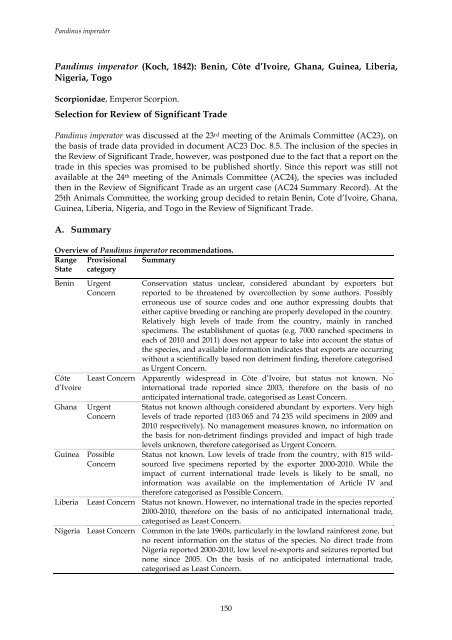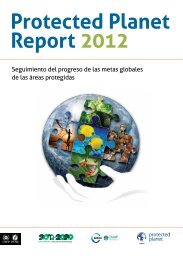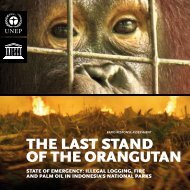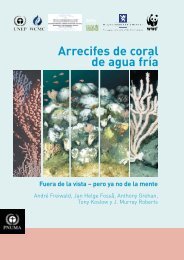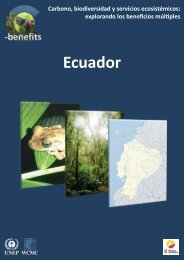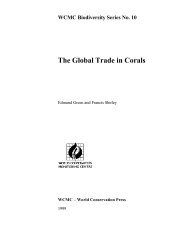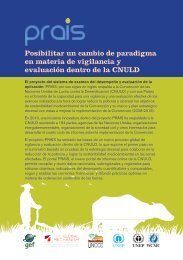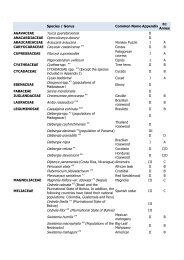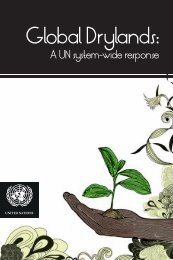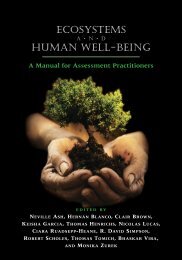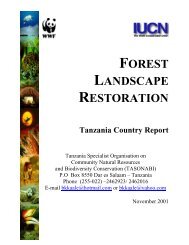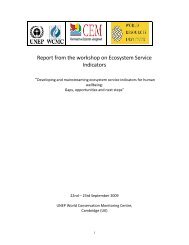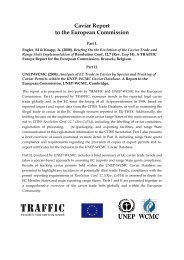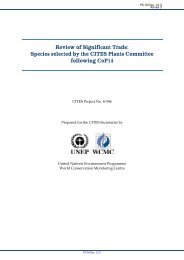2012. Review of Significant Trade - Cites
2012. Review of Significant Trade - Cites
2012. Review of Significant Trade - Cites
Create successful ePaper yourself
Turn your PDF publications into a flip-book with our unique Google optimized e-Paper software.
Pandinus imperator<br />
Pandinus imperator (Koch, 1842): Benin, Côte d’Ivoire, Ghana, Guinea, Liberia,<br />
Nigeria, Togo<br />
Scorpionidae, Emperor Scorpion.<br />
Selection for <strong>Review</strong> <strong>of</strong> <strong>Significant</strong> <strong>Trade</strong><br />
Pandinus imperator was discussed at the 23 rd meeting <strong>of</strong> the Animals Committee (AC23), on<br />
the basis <strong>of</strong> trade data provided in document AC23 Doc. 8.5. The inclusion <strong>of</strong> the species in<br />
the <strong>Review</strong> <strong>of</strong> <strong>Significant</strong> <strong>Trade</strong>, however, was postponed due to the fact that a report on the<br />
trade in this species was promised to be published shortly. Since this report was still not<br />
available at the 24 th meeting <strong>of</strong> the Animals Committee (AC24), the species was included<br />
then in the <strong>Review</strong> <strong>of</strong> <strong>Significant</strong> <strong>Trade</strong> as an urgent case (AC24 Summary Record). At the<br />
25th Animals Committee, the working group decided to retain Benin, Cote d’Ivoire, Ghana,<br />
Guinea, Liberia, Nigeria, and Togo in the <strong>Review</strong> <strong>of</strong> <strong>Significant</strong> <strong>Trade</strong>.<br />
A. Summary<br />
Overview <strong>of</strong> Pandinus imperator recommendations.<br />
Range<br />
State<br />
Provisional<br />
category<br />
Summary<br />
Benin<br />
Côte<br />
d’Ivoire<br />
Ghana<br />
Guinea<br />
Urgent<br />
Concern<br />
Conservation status unclear, considered abundant by exporters but<br />
reported to be threatened by overcollection by some authors. Possibly<br />
erroneous use <strong>of</strong> source codes and one author expressing doubts that<br />
either captive breeding or ranching are properly developed in the country.<br />
Relatively high levels <strong>of</strong> trade from the country, mainly in ranched<br />
specimens. The establishment <strong>of</strong> quotas (e.g. 7000 ranched specimens in<br />
each <strong>of</strong> 2010 and 2011) does not appear to take into account the status <strong>of</strong><br />
the species, and available information indicates that exports are occurring<br />
without a scientifically based non detriment finding, therefore categorised<br />
as Urgent Concern.<br />
Least Concern Apparently widespread in Côte d’Ivoire, but status not known. No<br />
international trade reported since 2003, therefore on the basis <strong>of</strong> no<br />
anticipated international trade, categorised as Least Concern.<br />
Urgent<br />
Concern<br />
Possible<br />
Concern<br />
Status not known although considered abundant by exporters. Very high<br />
levels <strong>of</strong> trade reported (103 065 and 74 235 wild specimens in 2009 and<br />
2010 respectively). No management measures known, no information on<br />
the basis for non-detriment findings provided and impact <strong>of</strong> high trade<br />
levels unknown, therefore categorised as Urgent Concern.<br />
Status not known. Low levels <strong>of</strong> trade from the country, with 815 wildsourced<br />
live specimens reported by the exporter 2000-2010. While the<br />
impact <strong>of</strong> current international trade levels is likely to be small, no<br />
information was available on the implementation <strong>of</strong> Article IV and<br />
therefore categorised as Possible Concern.<br />
Liberia Least Concern Status not known. However, no international trade in the species reported<br />
2000-2010, therefore on the basis <strong>of</strong> no anticipated international trade,<br />
categorised as Least Concern.<br />
Nigeria Least Concern Common in the late 1960s, particularly in the lowland rainforest zone, but<br />
no recent information on the status <strong>of</strong> the species. No direct trade from<br />
Nigeria reported 2000-2010, low level re-exports and seizures reported but<br />
none since 2005. On the basis <strong>of</strong> no anticipated international trade,<br />
categorised as Least Concern.<br />
150


